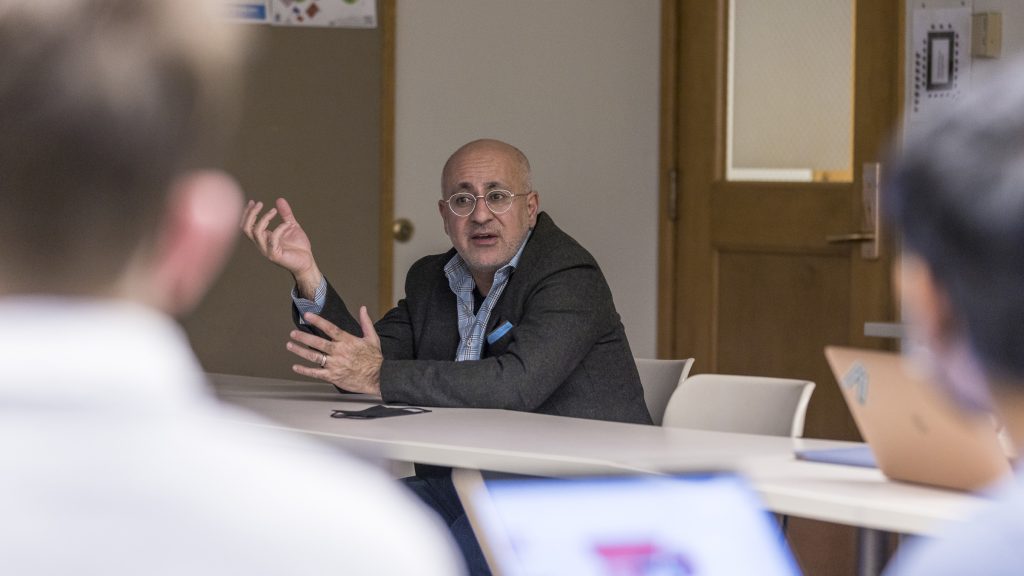
“Everyone who starts a company is an outsider, so you’re among giants! I really appreciate [Ali Alizadeh’s] encouragement and attention to students.”
—Chloe Vasquez ’24
Entrepreneur and visiting economics professor Ali Alizadeh ’85 says that successful startups all have a big why. Why, for example, can’t I buy a mattress online and have it delivered to my home? Or, why can’t I get eyeglasses more cheaply and easily? “Startups are something that you start thinking about,” he says. “And then you begin to obsess about it, and then it begins to consume you.”
This semester, students in his two-credit class, The DNA of Successful Startups, are discovering their own whys and learning just what it takes to succeed at a startup.
Each class session begins with student presentations about successful startups or companies like Uber, Venmo, and Airbnb. Students, says Alizadeh, cover how the company was started and financed, who its principals were, how they pivoted, challenges they faced, and, if they exited, how they did that. That’s followed by Q&A and lectures by guest speakers or Alizadeh himself, who brings decades of startup experience to the classroom.
After working at investment banks in Chicago, New York, and Los Angeles, Alizadeh and his business partner, Peter Ahn ’87, now a Macalester Trustee, “peeled off and started our own boutique investment banking firm that morphed into a quasi private equity firm.” In 2001, after returning to the Twin Cities, Alizadeh and Ahn co-founded Hemisphere, which he describes as “a very active investor that also provides an array of services such as accounting, finance, and marketing to its investment companies so entrepreneurs can really focus on the operation of their business.”

Chloe Vasquez ’24 (Denton, Texas), who recently declared majors in political science and economics, says Alizadeh truly invests in his students. “It means so much to have him tell everybody that, no matter where you are from, you’re not an outsider,” she says. “Everyone who starts a company is an outsider, so you’re among giants! I really appreciate his encouragement and attention to students.”
Vasquez’s entrepreneurial why arose out of a dangerous experience involving her mother and a pit viper last October. When her mother was bitten by the venomous snake in Costa Rica, Vasquez left school and took classes online for a month to take care of her. Her mother, she says, received great care and is recovering. “Luckily, Costa Rica has a wonderful [anti-venom] product made for them,” says Vasquez. “I was taking some health classes at the time and I started looking at the numbers. I realized that snake bite is now the most neglected of all tropical diseases. Now I have a project plan to start anti-venom companies in places that don’t have anti-venom made for their region.”
By the end of the course, Vasquez and her classmates will have learned things like how to test an idea, how to put together a simple business plan, how to pitch ideas and raise capital, and equity structure and dilution.
For Vasquez, the class has been serendipitous. Her former Arabic teacher recently reached out with a second why–a proposition for Vasquez to be a business partner for a tourism startup in Morocco. “It’s been really exciting to take this class and apply it in real life,” she says. “The fact that this class was offered might have changed the track of my life.”
Alizadeh says the course was sparked by wanting to help students learn not to make the same mistakes he’s made as an entrepreneur. It also grew out of a desire to give back to Macalester. “I owe a huge debt of gratitude to Dr. Vasant Sukhatme, who taught economics, and Dr. Karl Egge, who taught finance, and to Dr. Chuck Green, in political science, who recently passed on,” he says. “They helped all of us think, and that’s certainly what I want to get out of any educational environment–just the ability to think on my feet. And those three gentlemen really helped.”
March 28 2022
Back to top




